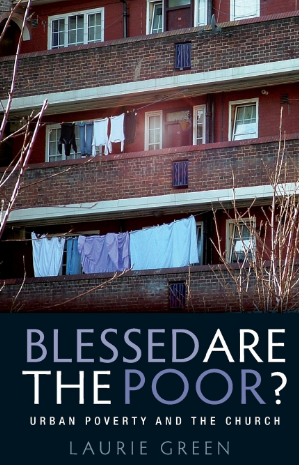Urban poverty and the church
How the perspective of the poor opens us up to new biblical and theological insights - and what it means to be Church in a post-secular society
 Blessed are the poor? Urban poverty and the church
Blessed are the poor? Urban poverty and the church
By Laurie Green
SCM 2015
ISBN: 978-0334053651
Reviewed by: Sally Nelson
A colleague undertakes missions in several developing countries. The events are well attended, heaving at the seams, and people are often healed almost incidentally of physical, spiritual and psychological problems.
'If I try this at home', he remarks, 'nothing happens'.
At the ministers' meeting this phenomenon was turned over, analysed, wondered at. But once you've read Laurie Green's book, you'll understand why: God is especially present with the 'poor'.
Green, a retired Anglican bishop with a passion for the poor, is deeply committed to the practice of reflective theology (see his textbook, Let's do theology, for example): we start with human experience, identify the issues, and reflect on them in the light of the gospel.
From this will emerge a godly vision for the next step, taking us deeper into our faith and practice. It is an incarnational method that can be practised competently by any Christian, not just trained theologians.
Green uses this method to shape the book, whose structure falls naturally into four key movements: hearing the stories and setting the context; exploring the biblical themes; theological perspectives, and suggestions for action.
Green first gives us the historical context for the poor in the UK today, focusing on those who live on urban estates, but acknowledging that poverty is found elsewhere too. Why, we may ask, are there so many poor people on estates? Green tells the story, a sorry one of social, political and economic movements that have led to the degradation of strong working communities, fragmenting and marginalising them at the edges of affluent post-war British society.
As industrialisation floundered and failed under global market pressures, so did the unions, social groups and communitas that gave poorer people a voice and an identity.
Green records conversations from the estates, letting the voices speak for themselves in these pages. What does it feel like to be part of a community where there is little work and little hope? Where gangs rule the night? Where you are blamed for being poor?
The biblical reflection comes initially through an exploration of the Lord's Prayer, which Green uses to expose the difference between 'kingdom' and 'opposing' values (many of the latter are endemic in modern culture). He then moves on to the challenge of the Beatitudes: what does it mean to be blessed, and what does it mean to be blessed as the poor?
Green notes in particular the important fact that Jesus never speaks about the poor, but to them and with them, never commenting authoritatively on the situation of the poor from outside, but entering their life. Our God is a God who is especially present with the poor. Green stops short of naming the poor as sacramental, but there is an intuitive connection (see p.132).
Green then proceeds to the part of the discussion I personally found the most engaging: the practice of cultivating a hermeneutic of justice in place of the church's existing tendency to a hermeneutic of order, quoting liberation theologian Bonino,'The true question is not "What degree of justice (liberation of the poor) is compatible with the maintenance of the existing order?", but "What kind of order is compatible with the exercise of justice (the right of the poor)?".'
Green argues that once we start to adopt this hermeneutic of justice, we must read the Bible in new ways.
The implications for the church and its structures, compromises, and values are huge. 'In the past the Church...has often delighted in expecting the privilege of power', comments Green, noting that in today's society the church is far less likely to be afforded that privilege - and perhaps that will be her salvation.
He sees the growing distrust of the Christendom model as a kairos moment for the church, but notes that to abandon the past structures is an enormous challenge to those who have invested in them. He ends the book with some stories of small, incarnational expressions of church - not, perhaps, entirely new to us, but coming fresh after this helpful exploration.
Many of the ideas and changes Green identifies should not be a problem for Baptists - indeed, they should be in our DNA. We are already, ideologically, on the margins of the already marginal Christian church in the UK - for we are Dissenters.
Yet how we wish to be big and important! We are already programmed to be a people of justice, yet how we love the hermeneutic of order, and our 'doing of good to' those 'less fortunate'. We are already those who respect the voice from the floor in our congregationalism, yet how we love to institute programmes of management and growth and strategy from the top.
It is costly to hear a prophetic word of revelation that comes from those we secretly relegate to the margins: the poor, the under-resourced, the poorly educated.
To respond to such a challenge may mean giving ourselves away, and giving away church as we have known and loved it, for Jesus warns us that discipleship means losing everything we thought mattered, in order to gain that which really does.
Sally Nelson is a tutor Northern Baptist College
This review was originally published in Regent’s Reviews, based at Regent’s Park College, Oxford. Regent’s Reviews is published every April and October.
Baptist Times, 01/10/2016